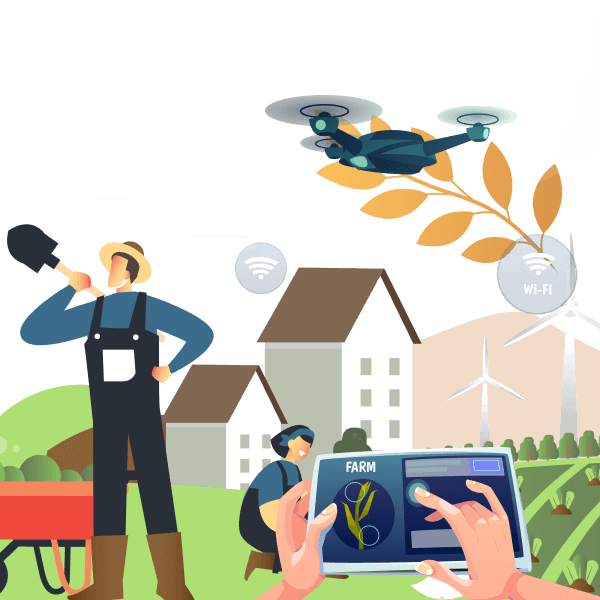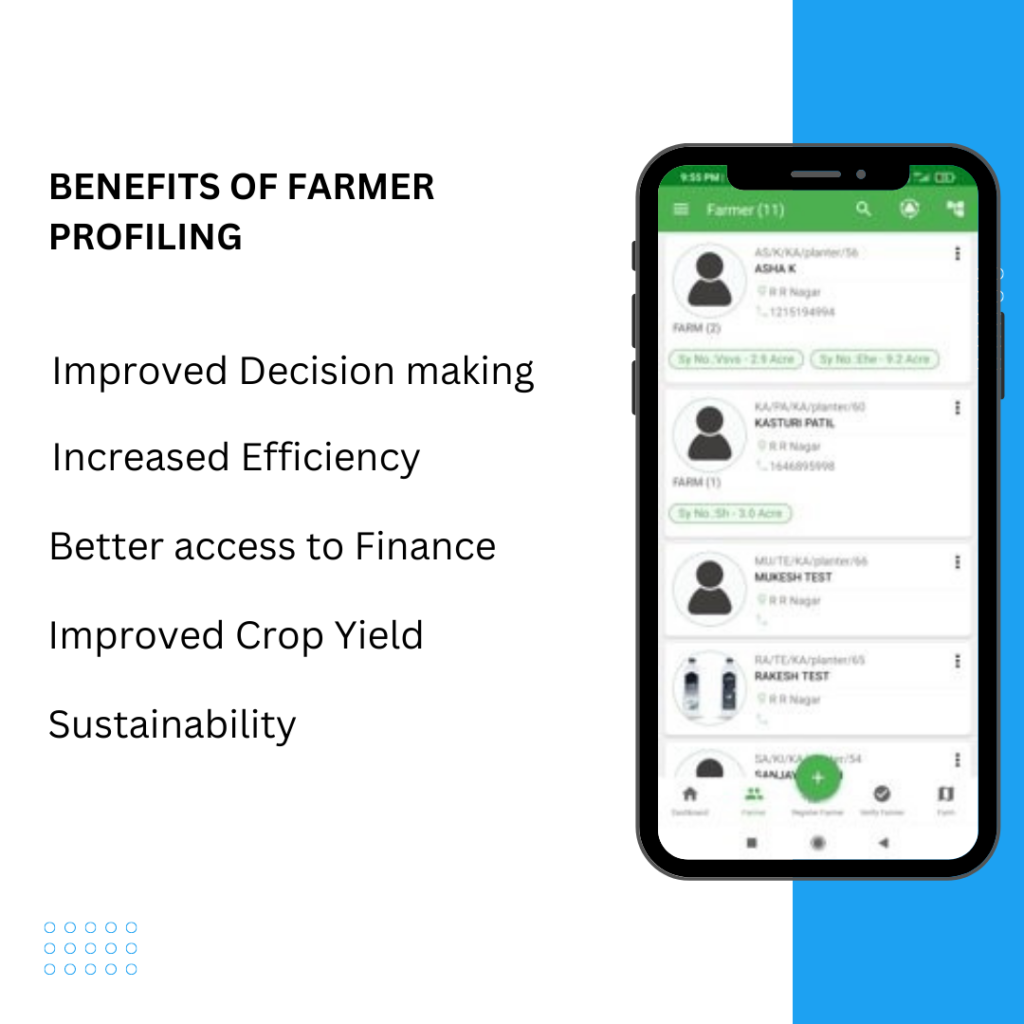Contact: +91 99725 24322 |
Menu
Menu
Quick summary: Discover why digital farmer profiling is the first step to traceability, EUDR compliance, and sustainable sourcing. Learn how to digitize your farm network — even offline.

Today the increasingly regulated and transparency-driven agri landscape, has made Digital Farmer Profiling a business-critical necessity. For agri-exporters, cooperatives, and sustainability-driven brands, the inability to accurately capture, manage, and verify farmer-level data is creating major roadblocks to traceability, EUDR compliance, and certification readiness.
According to FAO, more than 90 % of the farms in the world are family farms and they produce 80% of the food and operate 75% of the land. 72% of lands are less than 2 hectares.
Paper-based systems, fragmented spreadsheets, and limited field visibility make it nearly impossible to prove deforestation-free sourcing or ethical labor practices — putting both buyer confidence and market access at risk. The solution? Start at the source — with digital profiling that transforms your supply chain from the ground up.
Key Takeaways
There are an estimated 570 million smallholder farms worldwide that play a significant role in food production as well as maintaining the genetic diversity of food supply, mitigating the risks of food insecurity and environmental degradation. Effective farmer onboarding and profiling are fundamental components of modern farm management systems, crucial for ensuring the efficiency, sustainability, and transparency of agricultural operations.
Managing thousands of farmers through spreadsheets and paper forms just doesn’t cut it anymore. Whether you’re an agri-exporter trying to prove EUDR compliance, or a co-op looking to scale sustainably, you can’t build a transparent supply chain without knowing who your farmers are and how they farm.
That’s where Digital Farmer Profiling comes in.
At its core, digital farmer profiling is the process of capturing, storing, and managing detailed farm-level data using digital tools — usually through mobile apps, field tablets, or online platforms.
But it’s not just about digitizing a form.
It’s about creating a real-time, verified, traceable identity for each farmer — so you can meet regulatory requirements, assure buyers, and build long-term impact.
Think of it like a digital KYC for your farm network — searchable, shareable, and audit-ready.

You can’t trace what you don’t know. And if you don’t know your farmers — where they are, what they grow, or how they grow it — your traceability story starts off incomplete.
Digital farmer profiling is no longer a nice-to-have. It’s the foundation of trust, transparency, and trade.
You can’t build a compliant or transparent supply chain if you don’t know exactly who you’re sourcing from — or what’s happening at the farm level.
Whether you’re exporting coffee, cocoa, rubber, or spices, today’s compliance landscape isn’t just about getting the product out — it’s about proving where it came from, how it was grown, and who grew it. And more importantly, proving that no harm was done to people or the planet in the process.
That’s why Digital Farmer Profiling isn’t a checkbox — it’s your first line of defense.
| EUDR (EU Deforestation Regulation) | GPS coordinates, plot boundaries, land-use history, due diligence documents |
| FairTrade | Age verification, group membership, fair pricing practices |
| Organic Certification | Field traceability, non-GMO practices, declaration records |
| Rainforest Alliance | Deforestation-free sourcing, certified practices, geo-verification |
They all start with accurate, verified farmer data.
Consumers, buyers, and regulators are no longer tolerating vague sourcing claims like “ethically grown” or “farm-direct.”
They want proof — and they want it in real time.
Without digital profiling, there’s no scalable way to:
According to the Global Reporting Initiative, over 60% of traceability audit failures are linked to incomplete or incorrect supplier records.
That’s a huge number — and one that you can easily avoid by digitizing your farmer data from Day 1.
You can’t track a batch without knowing which farm it came from.
You can’t verify a plot without a GPS pin.
You can’t pass an audit without clean, consistent records.
In short?
Your traceability system is only as strong as the farmer profiles it’s built on.
That’s why we always say: “Don’t start with the batch. Start with the farmer.”
If compliance is your goal, digital farmer profiling is your gateway.
It builds the foundation for everything else — traceability, certification, transparency, and trust.
If you’re managing a large network of smallholder farmers, whether you’re an exporter, co-op lead, or sustainability head, you’ve probably asked yourself…
“How do I collect clean, accurate farm data without driving my field team crazy — or relying on patchy internet?”
You’re not alone.
With regulations tightening and buyers demanding full traceability down to the plot, choosing the right farmer profiling platform is no longer optional — it’s mission-critical. But not just any software will do. It has to be built for the realities of agri supply chains.
So what should you look for?
Here’s what the most forward-thinking agri-exporters and cooperatives are demanding in a digital farmer profiling solution:
Most smallholder farmers live in regions where internet access is unreliable. Expecting real-time cloud sync at every step? Not realistic.
Your field agents need to collect data in offline mode — then sync automatically when they’re back in range. No missed records. No broken workflows.
Discover how forward-thinking co-ops and exporters are using offline mapping and data sync to stay compliant, even in the most remote regions. No internet? No problem. Just reliable, real-time traceability that works where your farmers are.
Read the case study to see how you can digitize your farm network — without compromising on connectivity, compliance, or control.
If you’re working toward EUDR, Organic, or RA compliance, GPS coordinates and mapped plot boundaries aren’t a “nice to have” — they’re mandatory.
A good platform lets you draw, auto-capture, or upload plot boundaries, tag them to a farmer, and even check against deforestation or restricted zones.
Want to Take the Guesswork Out of Organic Compliance?
See how leading agri-businesses are using geo-mapping and plot-level visibility to track organic practices, streamline audits, and build trust with certifiers — all in real time.
Ready to simplify your organic certification process?
Read the case study and explore how geo-mapped traceability can transform your farm operations and compliance journey.
Farmer declarations, land ownership proofs, certification copies — these are the heart of audit-readiness. But scanning documents isn’t always feasible in rural areas.
The right platform should let agents snap photos of documents, tag them to a farmer profile, and submit instantly — without third-party apps or manual uploads.
Most smallholders don’t operate individually. They’re part of co-ops, self-help groups, or FPOs. And not everyone speaks the same language — literally.
Look for features that:

Farmer data is only valuable if it’s usable across your supply chain — from sourcing to sustainability reporting.
The ideal platform should offer:
Digitizing rural supply chains is not plug-and-play. It’s complex, emotional, and often frustrating — not because tech isn’t capable, but because people, places, and priorities are so different on the ground.
If you’re a co-op manager, exporter, or agri-sustainability lead trying to bring digital profiling into a farmer network, you’ve likely run into one (or more) of these roadblocks:
You roll out a new profiling tool and… field agents hesitate. Farmers ask, “Why are you collecting this data? What’s in it for me?”
It’s not about the tech — it’s about trust. Many smallholder communities have been burned by data collection efforts that promised value but delivered little.
What to Do:
Your profiling platform might be best-in-class. But the agents using it are working with low-end smartphones and no network in half the areas they cover.
Most profiling platforms weren’t designed for real-world, low-connectivity conditions — which leads to failed syncs, lost data, and abandoned efforts.
What to Do:
Ever onboard the same farmer twice because names were misspelled or IDs weren’t validated? It’s more common than you think — and a nightmare during audits.
Without a centralized, easy-to-search database, field agents often create duplicate profiles — while farmers get confused, suspicious, or fatigued by repeated questioning.
What to Do:
Technology alone won’t solve profiling. But tech + empathy + strategy will.
You’re not just building digital farmer records.
You’re building a traceable, transparent, trusted supply chain — one profile at a time.
Agribusinesses leverage TraceX to profile farmers based on socio-economic factors, educational background, and other custom attributes.
This information is seamlessly linked and mapped with external ERP applications, providing holistic insights into farmer demographics and characteristics.

TraceX’s reporting features empower agribusinesses to generate detailed reports on socio-economic impact, educational backgrounds, and overall sustainability performance of farms.
These reports serve as valuable tools for assessing the effectiveness of sustainability initiatives and making data-driven decisions.
To uphold ethical and legal standards, TraceX enforces age restrictions to prevent child labor in farming activities.
Farmers are required to validate the age of individuals involved in farm activities, ensuring compliance with regulatory requirements.

TraceX integrates Aadhaar verification for Know Your Customer (KYC) validations, ensuring accurate identification of farmers and a secure onboarding process.
This feature enhances the authenticity of farmer profiles and mitigates the risk of identity fraud.
Agribusinesses utilize custom verification tags such as “Bank Verified” and “Animal Welfare Farmers” to highlight specific attributes associated with farmers.
These tags enhance transparency and trust by providing stakeholders with relevant information about farmer credentials and practices.

TraceX facilitates the efficient management of extensive farmer networks through its bulk import feature.
This feature simplifies the onboarding process and enables seamless data updates, saving time and resources for agribusinesses.
The system generates custom farmer IDs and ID cards, streamlining farmer identification during agribusiness activities, events, and engagements.
This ensures easy access to farmer information and enhances security measures within the supply chain.

Agribusinesses create and manage agreements with farmers using TraceX, outlining sustainability practices, resource usage limits, and carbon management goals.
These agreements serve as contracts that formalize the relationship between agribusinesses and farmers, setting clear expectations and responsibilities.
TraceX establishes business rules aligned with agreements to ensure adherence to sustainability practices.
Violations of these rules trigger alerts for timely intervention, allowing agribusinesses to address issues promptly and maintain compliance.
The maker/checker workflow in TraceX enables agribusinesses to track the entire lifecycle of agreements, from creation to approval and execution.
This workflow enhances transparency and accountability by documenting each stage of the agreement process and facilitating seamless collaboration between stakeholders.


Farmer profiling involves collecting data on individual farmers to gain insights into their farming practices, preferences and challenges. The information gathered through profiling improves farm management practices to a great extent.
If you’re serious about traceability, transparency, or tapping into premium markets, there’s no shortcut — you have to start at the source. Digital farmer profiling isn’t just a tech upgrade — it’s a mindset shift. It’s about knowing your farmers, building trust, and creating the kind of data foundation that powers everything from EUDR compliance to buyer trust to real social impact.
Whether you’re managing 500 or 5,000 smallholders, the right profiling solution can turn complexity into clarity — and manual work into automated, auditable insight.
Because the future of agri-trade belongs to those who can prove their story — and it all begins with the farmer.
Digital farmer profiling is the process of capturing farm-level data like names, locations, crops, GPS coordinates, and certifications using digital tools. It’s essential for traceability, compliance (like EUDR), and building transparent, auditable supply chains.
Yes! Modern farmer profiling platforms are designed to work offline. Field agents can collect data, photos, and GPS coordinates without internet and sync it later — making it perfect for rural or remote regions.
EUDR and other certifications require plot-level traceability, age declarations, land use history, and compliance documents. Digital profiling captures and stores all this information in one place, making audits faster, easier, and error-free.
